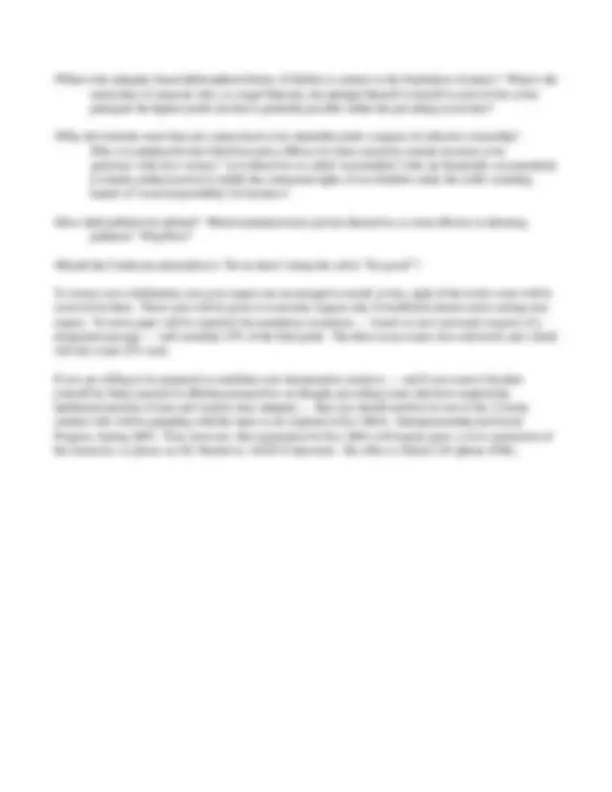



Study with the several resources on Docsity

Earn points by helping other students or get them with a premium plan


Prepare for your exams
Study with the several resources on Docsity

Earn points to download
Earn points by helping other students or get them with a premium plan
Community
Ask the community for help and clear up your study doubts
Discover the best universities in your country according to Docsity users
Free resources
Download our free guides on studying techniques, anxiety management strategies, and thesis advice from Docsity tutors
Material Type: Quiz; Class: Behavioral Economics; Subject: Economics; University: Wofford College; Term: Unknown 1989;
Typology: Quizzes
1 / 2

This page cannot be seen from the preview
Don't miss anything!


POSTSCRIPT on Eco 480A
Every spring Dr. Machovec will be offering an interdisciplinary seminar with no prerequisites entitled Entrepreneurship and Social Progress. It is listed in the electronic course schedule as Eco 480A (T,Th at 9:30 in Daniel 218). The 'text' will be a pre-printed assemblage of readings on classical and modern ideas from the following fields: Natural Philosophy (25%), Political Philosophy (25%), Moral Philosophy (25%), and the socio-institutional (non-technical) branches of Economics (25%). The following list is a sample of the questions to be examined:
•Is all human action determined by preexisting physical-chemical (material) forces?
•What is the nature of entrepreneurship, and how does the existence of entrepreneurial behavior potentially discredit the philosophy of material determinism?
•What are the political and economic consequences of embracing a conception of social justice rooted in some notion of egalitarian outcomes? Is there a viable alternate criterion for social justice?
•How can people be induced to voluntarily and regularly cooperate with each other?
•How does a market economy employ self-interest to minimize selfishness?
•How/why is 99.9% of all human cooperation indirect, impersonal, hidden, unintended, and therefore unappreciated by most intellectuals?
•What are the competing Enlightenment philosophies of social order?
•Does anarchy necessarily imply chaos?
•Does an orderly design necessarily imply a designer?
•Was Charles Darwin's theory of evolution inspired by economists' circa-1800 vision of the competitive market economy as an un directed system of "creative destruction"?
•What, exactly, was the full contextual socio-political meaning of the 19th-century call by utilitarian philosophers for public policies to ensure "the greatest good for the greatest number"?
•How/why are entrepreneurs uniquely instrumental in facilitating people's quest "to live, to live well, to live better"? (Alfred North Whitehead).
•What determines how much a thing is 'worth' — that is, its exchange value?
•How did Immanuel Kant's neglected yet superior insights on value come to be unwittingly adopted (a century after Kant's main writings) by the fathers of the modern school of economics?
•How did Adam Smith inspire (ironically) the revolutionary vision of Karl Marx?
•What is the antiquity-based philosophical history of fidelity to contract as the foundation of justice? What is the moral duty of someone who, as a legal fiduciary, has pledged himself or herself to earn for his or her principals the highest profit rate that is prudently possible within the prevailing social rules?
•Why did Aristotle assert that one cannot learn to be charitable under a regime of collective ownership? Why is it unethical for the Chief Executive Officer of a firm owned by outside investors to be 'generous' with their money? Is it ethical for so-called 'st ake holders' (who are financially un committed) to employ political power to nullify the contractual rights of st ock holders under the noble-sounding banner of 'social responsibility' for business?
•How shall pollution be defined? Which institutions have proven themselves as most effective at deterring pollution? Why/How?
•Should the Confucian admonition to "Do no harm" trump the call to "Do good!"?
To ensure cross-fertilization, non-econ majors are encouraged to enroll; in fact, eight of the twelve seats will be reserved for them. These seats will be given to economics majors only if insufficient interest arises among non- majors. No term paper will be required, but mandatory recitations — based on one's personal exegesis of a designated passage — will constitute 25% of the final grade. The three essay exams (two mid terms and a final) will also count 25% each.
If you are willing to be prepared to contribute your interpretative analyses — and if you want to broaden yourself by being exposed to differing perspectives on thought-provoking issues that have inspired the intellectual passions of men and women since antiquity — then you should enroll to be one of the 12 lucky scholars who will be grappling with the topics to be explored in Eco 480A: Entrepreneurship and Social Progress, Spring 2003. Note, however, that registration for Eco 480A will require prior written permission of the instructor, so please see Dr. Machovec ASAP if interested. His office is Daniel 219 (phone 4586).